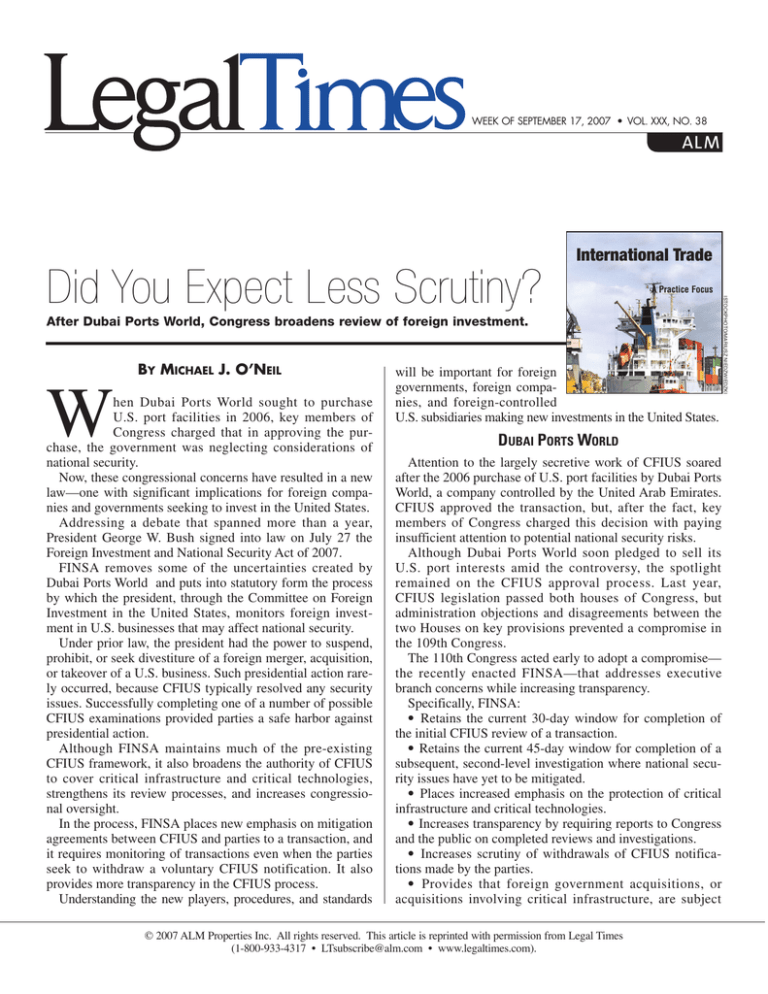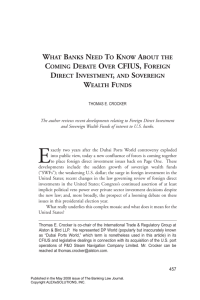
WEEK OF SEptember 17, 2007 • VOL. XXX, NO. 38
A Practice Focus
After Dubai Ports World, Congress broadens review of foreign investment.
W
By Michael J. O’Neil
hen Dubai Ports World sought to purchase
U.S. port facilities in 2006, key members of
Congress charged that in approving the purchase, the government was neglecting considerations of
national security.
Now, these congressional concerns have resulted in a new
law—one with significant implications for foreign companies and governments seeking to invest in the United States.
Addressing a debate that spanned more than a year,
President George W. Bush signed into law on July 27 the
Foreign Investment and National Security Act of 2007.
FINSA removes some of the uncertainties created by
Dubai Ports World and puts into statutory form the process
by which the president, through the Committee on Foreign
Investment in the United States, monitors foreign investment in U.S. businesses that may affect national security.
Under prior law, the president had the power to suspend,
prohibit, or seek divestiture of a foreign merger, acquisition,
or takeover of a U.S. business. Such presidential action rarely occurred, because CFIUS typically resolved any security
issues. Successfully completing one of a number of possible
CFIUS examinations provided parties a safe harbor against
presidential action.
Although FINSA maintains much of the pre-existing
CFIUS framework, it also broadens the authority of CFIUS
to cover critical infrastructure and critical technologies,
strengthens its review processes, and increases congressional oversight.
In the process, FINSA places new emphasis on mitigation
agreements between CFIUS and parties to a transaction, and
it requires monitoring of transactions even when the parties
seek to withdraw a voluntary CFIUS notification. It also
provides more transparency in the CFIUS process.
Understanding the new players, procedures, and standards
will be important for foreign
governments, foreign companies, and foreign-controlled
U.S. subsidiaries making new investments in the United States.
Dubai Ports World
Attention to the largely secretive work of CFIUS soared
after the 2006 purchase of U.S. port facilities by Dubai Ports
World, a company controlled by the United Arab Emirates.
CFIUS approved the transaction, but, after the fact, key
members of Congress charged this decision with paying
insufficient attention to potential national security risks.
Although Dubai Ports World soon pledged to sell its
U.S. port interests amid the controversy, the spotlight
remained on the CFIUS approval process. Last year,
CFIUS legislation passed both houses of Congress, but
administration objections and disagreements between the
two Houses on key provisions prevented a compromise in
the 109th Congress.
The 110th Congress acted early to adopt a compromise—
the recently enacted FINSA—that addresses executive
branch concerns while increasing transparency.
Specifically, FINSA:
• Retains the current 30-day window for completion of
the initial CFIUS review of a transaction.
• Retains the current 45-day window for completion of a
subsequent, second-level investigation where national security issues have yet to be mitigated.
• Places increased emphasis on the protection of critical
infrastructure and critical technologies.
• Increases transparency by requiring reports to Congress
and the public on completed reviews and investigations.
• Increases scrutiny of withdrawals of CFIUS notifications made by the parties.
• Provides that foreign government acquisitions, or
acquisitions involving critical infrastructure, are subject
© 2007 ALM Properties Inc. All rights reserved. This article is reprinted with permission from Legal Times
(1-800-933-4317 • LTsubscribe@alm.com • www.legaltimes.com).
istockphoto/Mariusz Niedzwiedzki
Did You Expect Less Scrutiny?
International Trade
to full investigations, unless the treasury secretary and the
head of the lead agency responsible for review, or their
high level designees, jointly determine that no national
security concern exists.
• Provides for civil penalties if parties to a transaction
violate FINSA provisions, including mitigation agreements.
FINSA adds a new criterion by which CFIUS is to conduct its reviews and investigations—securing the critical
infrastructure of the United States. The law provides that
CFIUS evaluations will consider both critical infrastructure and critical technologies. These definitions are broad.
Critical infrastructure is those “systems and assets, whether
physical or virtual, so vital to the United States that the incapacity or destruction of such systems or assets would have a
debilitating impact on national security.” Likewise, critical
technologies are “critical components, or critical technology
items essential to national defense.”
CFIUS will largely determine what infrastructure or technologies are critical to national security. Ultimately, CFIUS
can be expected to extend its reach beyond the traditional
bounds of review.
Into the Open
Until FINSA, CFIUS operated largely in secret. Its members were prohibited from discussing transactions under
scrutiny with anyone other than the parties. Decisions were
not published, and there was little oversight.
Congress sought to address CFIUS accountability and
transparency concerns through the following:
• Required guidance: FINSA requires that CFIUS issue
guidance on the types of transactions previously reviewed
that presented national security and critical infrastructure
concerns. This will provide some guidance to parties about
the threshold level at which CFIUS gauges security risks.
• Certified notices and investigation reports: FINSA
requires CFIUS to provide Congress notices of completion
of initial reviews and detailed reports after investigations
are completed. These notices and reports must be certified
in writing by the treasury secretary and the head of the lead
agency, or certain high level designees.
• Annual reports to Congress: Before July 31 each year,
CFIUS must provide to key congressional committees a
report on all CFIUS reviews and investigations. The annual
report, meant to be comprehensive, must include trend information on the number of withdrawals approved by CFIUS,
information on the types of security arrangements and conditions it has approved, and information on monitoring efforts
designed to mitigate national security concerns. An unclassified version of the study must be available to the public.
• Briefings upon request: CFIUS, subject to the need
to protect classified information, must provide briefings
to members of Congress on key committees and from the
jurisdictions affected by CFIUS actions.
Government Review
CFIUS review of a proposed foreign investment takes
several forms:
• Voluntary initial review: As was the case previously,
a party to a transaction may initiate review. CFIUS then is
required to determine within 30 days the effects the transaction would have on national security. CFIUS then must
either issue a recommendation for approval or proceed
to investigate.
• Withdrawals following notice of a voluntary initial
review: Unlike pre-existing CFIUS practice, however,
FINSA prohibits a party to the transaction from unilaterally withdrawing from a review once written notice has
been submitted. Withdrawal may occur only if approved
by CFIUS. As an additional precaution resulting from
congressional concern about overuse of voluntary withdrawals, FINSA requires CFIUS to subsequently track
actions of the parties.
This new requirement underscores the importance of due
diligence by a party before submission of a CFIUS notice,
including, as appropriate, informal discussions with CFIUS
or the lead agency.
• Unilateral initial review: FINSA allows CFIUS to
initiate reviews unilaterally, including reviews of cases previously reviewed in which false or misleading information
was provided or where a party intentionally and materially
breached a mitigation agreement. Unilateral reviews also
must be completed within 30 days.
• Subsequent investigation: FINSA provides that,
unless limited exceptions apply, an additional stage, a
full 45-day investigation, is required if the initial review
results in a finding that an unmitigated national security
threat exists, that the transaction involves a foreign government-controlled entity, or, in certain instances, that
critical infrastructure is involved. At the end of the 45day investigation, the matter is sent to the president for a
final decision.
• Safe harbor: Safe harbor protection can be forfeited if
a party makes a material misrepresentation of fact. FINSA
expands that to include a material violation of an obligation
undertaken under a mitigation agreement with CFIUS.
FINSA provides that CFIUS membership shall include the
secretaries of the Treasury, Homeland Security, Commerce,
Defense, State, and Energy Departments, as well as the
attorney general. Nonvoting members include the director
of national intelligence and the secretary of labor, both of
whom are new additions.
The treasury secretary serves as the CFIUS chairperson.
To provide the focus that some in Congress believed was
lacking for Dubai Ports World, Congress created an additional assistant treasury secretary tasked with overseeing
CFIUS matters. The hope is that this will heighten the attention within the department to FINSA.
For each transaction reviewed by CFIUS, the chairperson
must designate a lead agency that will be responsible for the
review of a particular case, for any negotiation of mitigation
measures designed to reduce national security risk, and for
any subsequent monitoring. The director of national intelligence is required to provide an analysis of potential national
security concerns.
© 2007 ALM Properties Inc. All rights reserved. This article is reprinted with permission from Legal Times
(1-800-933-4317 • LTsubscribe@alm.com • www.legaltimes.com).
FINSA provides that the president may include the heads
of other agencies on a case-by-case basis, and CFIUS may
consult other agencies as appropriate. FINSA also provides,
for the first time, civil penalties for companies that violate
CFIUS regulations, including actions that contravene a mitigation agreement.
In addition to adding some transparency, FINSA adds new
complexity, increased scrutiny, and a broader mandate that will
increase the number of transactions that CFIUS considers.
New oversight by Congress and the press will add to public
consciousness of certain foreign acquisitions. This will be so
even though the key requirements of the CFIUS process—such
as time limits on reviews and investigations—remain the same.
Consequently, those handling foreign acquisitions will see an
increasing number of transactions in which CFIUS must be
high on the list of due-diligence concerns.
Michael J. O’Neil is a partner in the Washington, D.C.,
office of Kirkpatrick & Lockhart Preston Gates Ellis. His
practice focuses on trade, export, security, information technology, and federal policy. He may be contacted at mike.
oneil@klgates.com.
© 2007 ALM Properties Inc. All rights reserved. This article is reprinted with permission from Legal Times
(1-800-933-4317 • LTsubscribe@alm.com • www.legaltimes.com).










